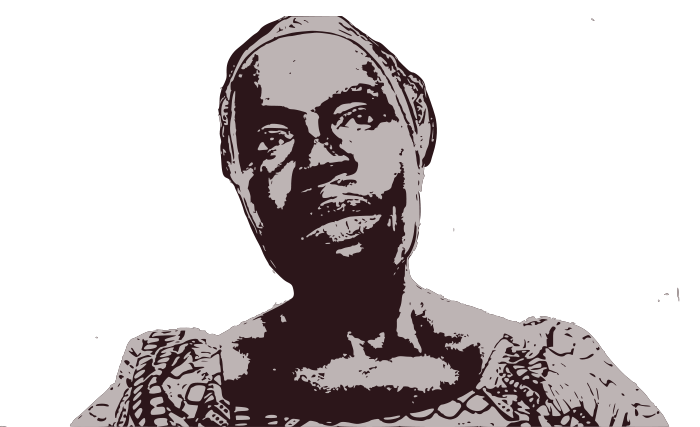-
 Meet Ma Anna Tue“I’m happy with my little parcel of land, with which I can stillcontinue my farming activities, collect fuel wood andmedicinal plants, and burn coal for sale.”Story provided by RRI
Meet Ma Anna Tue“I’m happy with my little parcel of land, with which I can stillcontinue my farming activities, collect fuel wood andmedicinal plants, and burn coal for sale.”Story provided by RRI
Age: 55
Profession: Subsistence Farmer and Human Rights Defender
Associated Organization: Rights and Resources Initiative
Ma Anna Tue, a resident of Compound Village in southeastern Liberia, is a subsistence farmer and community leader who depends on her customarily-held lands to collect firewood, medicinal plants, and non-timber forest products to sell to supplement her income. In Liberia, land grabbing is having a profound impact on the wellbeing of local communities – threatening their food and economic security.
Ma Anna Tue knows well the extent to which land grabbing has threatened local communities’ livelihoods and their cultural heritage. The destruction of farmlands, food crops, and cash crops, and the pollution of drinking water are common problems resulting from land grabbing by extractive corporations and agribusiness in Liberia. Furthermore, the destruction of community burial sites and sacred areas profoundly impacts a community’s values and traditions and has been known to cause conflict. Women like Ma Anna Tue are hardest hit by the impacts of land grabbing, and are often on the front lines of the fight to defend their lands from these external threats.
In 2012, the oil palm company, Golden Veroleum Liberia (GVL) approached Compound Village with a request to plant an oil palm nursery on their customary land. GVL informed Compound Village that the company had received a concession from the government to use a portion of the communities’ land.
“My grandfather was born here, and I have lived my whole life here,” said Ma Anna Tue. “All along, we had been enjoying our native land until Golden Veroleum came. When the company came, we did not deny them. We were told that the company needed land for a nursery for their oil palm. Later, we realized that they were here to plant on all our lands and that the land is not for us, but for the government. Where do they expect us to go live, in the sky? We no longer agree with their operations. They deceived us. Let them leave. We do not want them here.”
On December 14, 2012, community members participated in a meeting with GVL that was presided over by the local government-appointed commissioner of the district. During the meeting, some of the GVL Liberia managers asked community members who were present to sign an attendance sheet. Only after they had signed were community members informed that the purpose of the meeting was to gain the community’s consent to GVL’s operations.
Following this, the community members decided that they would not participate in the meeting until their legal advisor and community support organization was present. They demanded that their names be removed from the attendance sheet, citing concerns that GVL would use it as an indicator of community consent. However, GVL and the Commissioner refused and called in an elite police squad – the Emergency Response Unit (ERU) – to handle “rioting” community members who were “threatening the peace.”
Ma Anna Tue was more than 50 years old at the time, and not in good health. However, when she saw the police severely beating her son, she approached the ERU to find out what was happening. When she approached, the officers arrested her, beat her, and stripped her naked. She was thrown into the police pickup jeep along with other community members. They were taken directly to prison.
After spending almost two years in jail, Ma Anna Tue returned to what little land was left of her plot in early 2018. While she was in prison, GVL had overtaken most of the land owned by the community without respecting its right to free, prior, and informed, consent (FPIC), as guaranteed in international law.
“I am planting crops on the little portion of my land that is left to start earning my own income for survival,” she said. “So far, I have not yet experienced anyone trying to take my remaining land, and I’m happy because this is the life I’m used to living. I’m happy with my little parcel of land, with which I can still continue my farming activities, collect fuel wood and medicinal plants, and burn coal for sale.”
GVL is a member of the Roundtable on Sustainable Palm Oil (RSPO). In 2012, several organizations filed a complaint with the RSPO on behalf of communities in Sinoe County detailing violations of RSPO guidelines — including clearing land without the free, prior and informed consent of the customary landowners and failing to properly conduct social and environmental impact assessments of the area.
On February 13, 2018, the RSPO released its decision in the case, finding that GVL was non-compliant with FPIC principles, that there were elements of coercion in GVL’s methods, and that GVL did not engage with self-identified community representatives, among others. The RSPO demanded that GVL adhere to a timeline and action plan to make amends with communities where the company operations, or face suspension or even termination of membership. This decision – a result of the courage of community members like Ma Anna Tue and support from civil society allies – will send important signals to the government of Liberia and to the palm oil sector that community rights must be respected.

